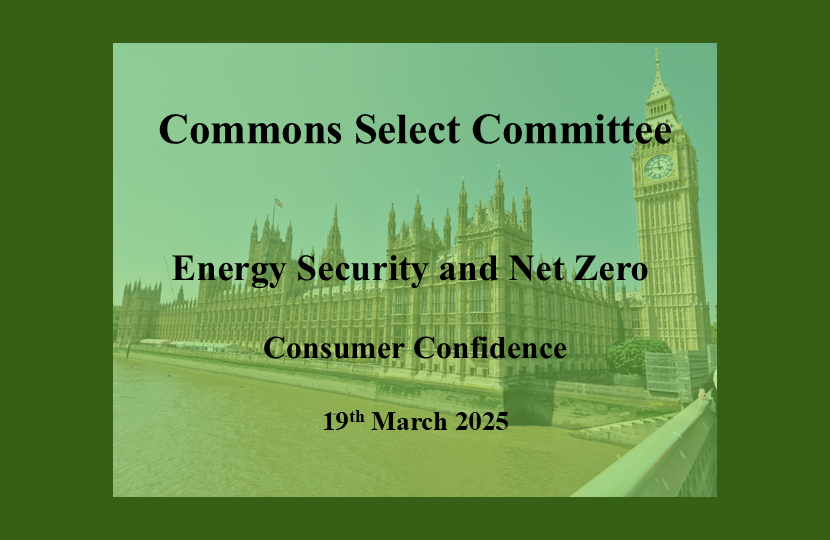
Chris Seeks Assurances For Consumers & Women In Energy Sector
Q83 Sir Christopher Chope: I sympathise with you, Minister, because you are trying to champion consumer confidence and you have some real problems. One of the first that you have to overcome is the fact that consumers were promised that their bills would go down by £300 and you have not got anywhere towards achieving that yet. Similarly, you have to try to rebuild confidence in smart meters. I do not know whether you heard the evidence earlier, but it seems that it is not just one in 10 but five in every 100 that is not working properly. There is a much bigger problem for smart meters, as a result of which the word on the street is, “I wouldn’t touch a smart meter.”
Will you, in the interim, stop essentially forcing consumers into having smart meters imposed on them? A lot of consumers feel that the smart meter system is duping them into believing that it is all for their own convenience and that they will be able to see how much energy they are using, whereas we know that in reality it is all designed to enable Big Brother to keep an eye on when and how the energy is being used. If the smart meters themselves do not work and then create all the problems we heard about earlier, people lose confidence in them. How are you going to rebuild that confidence? Wouldn’t one way be to introduce a guarantee—a Government-funded, supported guarantee—that anybody who has a smart meter installed will be able to have that put right quickly, within a specified timescale? That would replicate what should have been happening in relation to these other Government schemes.
As I understand it, even today there are 250,000 homes that are unmortgageable because they have been subject to retrofitted spray foam. What are we doing to help those people? They are completely under the cosh. As I think has already been made clear, there is a feeling out there that ECO4 and the Great British Insulation Scheme are still delivering bad results for people, so confidence is plummeting. Despite your best efforts, I think it will continue to plummet until such time as there are firm guarantees that people who have already been done down in various ways will get proper remedies and compensation, and people who are seduced into adopting these Government schemes in their own homes have an assurance that they are not going to suffer the same fate as so many others. So—
Chair: I am finally going to intervene and stop you there, because we are here to hear from the witnesses and not from the members of the Committee.
Sir Christopher Chope: I am sorry, Chairman, but that is what happens if you have been waiting for two hours to ask a question.
Chair: I do not think it was a question; it was a statement. I will ask the Minister to reply, but I suggest that your next questions should be a lot shorter.
Sir Christopher Chope: My next question will be much shorter, but perhaps the Minister would like to comment on that one first.
Miatta Fahnbulleh: I think there were five questions in that, so I will take each in turn. Is the inheritance really tough? Absolutely. Is the confidence in the system not where it needs to be? Absolutely. That is the backdrop, and the job is to try to turn that around. I am confident that we can turn it around.
Let me take each of the points in turn, starting with bills going down. In the end, that is our primary objective with everything we are trying to do. Colleagues in the Department are driving the move to clean power—our view is that decoupling and breaking our reliance on fossil fuel will be the key thing that helps us get bills down, because at the moment wholesale costs are the thing that is driving bills up—but that sits alongside upgrading people’s homes, so that we can make them warmer and cheaper to run. We are putting everything into the objective of delivering homes that are not just warm but ultimately cheaper to run for consumers, because that is all that really matters.
There is no compulsion on any household to adopt a smart meter. The reason we think smart meters are good, and the arguments that we will be trying to make and will drive a lot of the marketing campaign and the things that energy suppliers are doing, is that they mean that consumers know how much energy they are using, and that things like back billing and all the other things we talked about at the start of the session are reduced. But critically, I want to move from a world where consumers are takers of a system that does not really do very well by them, to a more flexible system with half-hourly rates in which a consumer can say, “I’m going to use my energy at this time because it’s better for me.” Smart meters mean that we can get to the world we want to, with smart homes, where people can basically sell their energy back into the grid and get money. We want empowered consumers, but to be empowered consumers they have to be smart consumers with smart homes, and that is the opportunity around smart meters.
Do we need to get the roll-out better? Absolutely. Any smart meter that does not work dents people’s confidence and trust in them, so we will never impose them on people. We need to make sure that they are persuaded that this is good for them, and show the benefits in tangible ways. That does, to be fair, mean benefits into your pocket.
When we are not delivering the standard, we have to make sure that there is that guarantee. Some of the work we are doing at the moment, thinking about smart meters and working with industry, is about saying, “What’s the standard that consumers can expect, that they are aware of, and then how do we make sure that there are clear incentives and sanctions if those sanctions aren’t met?” Otherwise, your point about confidence is absolutely a thing.
Finally, on spray foam specifically, I come back to the point I made that we have to get to a world where every upgrade is a good upgrade, whether it is through a Government scheme or not, quite frankly. That is not the world we are in, and that is a function of a system that is dysfunctional and that we need to reform. In the past eight months—and, to be fair, the Government before us tried to do this too—we have been working with MHCLG and the mortgage industry to say, “There cannot be a blanket presumption that just because someone has had spray foam you don’t give them a mortgage, because if it’s installed well, it’s absolutely fine.” We have got that reassurance now from a lot of the mortgage providers—I think there are one or two that we are still working with—in order to take away that genuine risk.
I am getting lots of emails from colleagues on behalf of their constituents for whom this is a problem. We have got to fix things like that and work with others in the system to do it, but ultimately, as you say, it is all about confidence and trust, so we have to design the system up-front so that consumers are at its heart, it is simple and fair, and, when things go wrong, people are confident that there is redress. That is not where we are now, but that is absolutely where we need to get to.
Chair: This will be the last question.
Q84 Sir Christopher Chope: May I express my appreciation to the Minister for her constructive and full response? My last question is slightly off-piste, but the figures we have been given by the Clerks to the Committee show that almost all the people who are working in the industry that we have been discussing this afternoon are men. What is the Minister doing to try to introduce the caring sex into this?
Miatta Fahnbulleh: The energy sector is dominated by men, as I am finding. There is a big push across the sector, but we are particularly exercised by it as a Department and trying to get more women in. I think about the warm homes plan: if we get that right, we will be creating jobs in every part of the country. Whether that is the work we are doing with industry, the money we are putting into training and grant schemes or the work we are doing with local authorities, we have to open it up. I was at Futurebuild, a big industry conference, and they were trying to bring in young students and female students in order to open this up. We definitely need diversity, but, most importantly, there are jobs that will be created here, and we need to make sure that those jobs are equally accessible to everyone.
Chair: Thank you very much, Minister. My daughter hopes to be one of those workers, as she wants to train as a heat pump installer.
Miatta Fahnbulleh: Amazing. I strongly encourage it!
- ENDS
